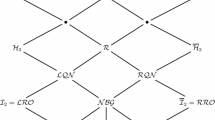Abstract
We show that \({\mathcal {V}(\mathbb {A}(\mathcal {T}))}\) does not have definable principal subcongruences or bounded Maltsev depth. When the Turing machine \({\mathcal {T}}\) halts, \({\mathcal {V}(\mathbb {A}(\mathcal {T}))}\) is an example of a finitely generated semilattice based (and hence congruence \({\wedge}\)-semidistributive) variety with only finitely many subdirectly irreducible members, all finite. This is the first known example of a variety with these properties that does not have definable principal subcongruences or bounded Maltsev depth.
Similar content being viewed by others
References
Baker K.: Finite equational bases for finite algebras in a congruence-distributive equational class. Advances in Math. 24, 207–243 (1977)
Baker K., Wang J.: Definable principal subcongruences. Algebra Universalis 47, 145–151 (2002)
Baker K., Wang J.: Approximate distributive laws and finite equational bases for finite algebras in congruence-distributive varieties. Algebra Universalis 54, 385–396 (2005)
Jónsson B.: On finitely based varieties of algebras. Colloq. Math. 42, 255–261 (1979)
Makkai M.: A proof of Baker’s finite-base theorem on equational classes generated by finite elements of congruence distributive varieties. Algebra Universalis 3, 174–181 (1973)
McKenzie R.: Finite equational bases for congruence modular varieties. Algebra Universalis 24, 224–250 (1987)
McKenzie R.: The residual bound of a finite algebra is not computable. Internat. J. Algebra Comput. 6, 29–48 (1996)
Moore M.: The undecidability of the definability of principal subcongruences. J. Symbolic Logic. 80, 384–432 (2015)
Park, R., Equational classes of non-associative ordered algebras. PhD thesis, University of California, Los Angeles (1976)
Willard R.: Tarski’s finite basis problem via \({\mathbb {A}(\mathcal {T})}\). Trans. Amer. Math. Soc. 349, 2755–2774 (1997)
Willard R.: A finite basis theorem for residually finite, congruence meet-semidistributive varieties. J. Symbolic Logic 65, 187–200 (2000)
Willard R.: Extending Baker’s theorem. Algebra Universalis 45, 335–344 (2001)
Willard R., The finite basis problem. In: Contributions to General Algebra, vol. 15, pp. 199–206. Heyn, Klagenfurt (2004)
Author information
Authors and Affiliations
Corresponding author
Additional information
Presented by M. Maroti.
Rights and permissions
About this article
Cite this article
Moore, M. The variety generated by \({\mathbb {A}(\mathcal {T})}\)– two counterexamples. Algebra Univers. 75, 21–31 (2016). https://doi.org/10.1007/s00012-015-0362-z
Received:
Accepted:
Published:
Issue Date:
DOI: https://doi.org/10.1007/s00012-015-0362-z




